VOICE ONE:
I'm Barbara Klein.
VOICE TWO:
And I'm Steve Ember with EXPLORATIONS in VOA Special English. Today we tell about hip-hop music with a message.
(MUSIC)
VOICE ONE:
Hip-hop music started in the South Bronx area of New York City in the early 1970s among young African Americans and Latino Americans. People would gather in the streets singing and dancing to hip-hop. It was a place for people to sing about social injustices as well as what was happening on the streets. Some of the world's greatest hip-hop singers started this way. Now, hip-hop is popular worldwide. It is often used to express social and political issues. Some people call these musicians socially conscious hip-hop artists.
VOICE TWO:
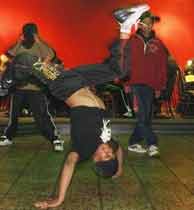
There are four main parts of hip-hop: MCing is singing words or what is called rapping. DJing is using records to produce special sounds. Graffiti is writing messages on outdoor surfaces. And breakdancing is a special kind of dance. Today we will tell about how performers in several countries use rapping to spread messages. Rapping could be described as speaking or singing words at a fast speed over music with quick beats. Some reports say rapping came from the West African tradition of Griots. These storytellers would quickly tell a story while someone played music.
VOICE ONE:
Hip-hop beats were made when a DJ used two records to create a special measured sound. Sometimes the DJ would move one record while holding the other one down. Other times he would move both records at the same time producing a quick measured beat. This is called scratching. DJs do this using a turntable. Today the turntable may be replaced by music that is produced on computers. Here is part of the song "Beat Street" by the famous scratcher and DJ Grand Master Flash.
(MUSIC)
VOICE TWO:
The Sugarhill Gang was one of the first groups to perform hip-hop. In the late 1970s, music producer Sylvia Robinson realized that hip-hop was becoming a popular part of street celebrations. She decided to find three MCs in her neighborhood in Englewood, New Jersey, and have them sing together. The men called themselves Wonder Mike, Big Bank Hank, and Master Gee. They went on to sing one of America's favorite songs of 1979, "Rapper's Delight."
"Rapper's Delight" was not one of hip-hop's first songs. But it made hip-hop popular in the United States and around the world.
(MUSIC)
VOICE ONE:
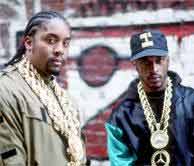
Eric B & Rakim was another American group that changed the sound of hip-hop. In 1986, 16-year-old Rakim started to work with the New York City music producer, Eric B. Rakim added different beats to the music and began using poetic words to spread his message. The two musicians produced four CDs together. As an individual musician, Rakim created four other CDs. One song that made the two famous is "Eric B is President". Many international socially conscious hip-hop artists say they became interested in hip-hop when they heard Rakim.
(MUSIC)
VOICE TWO:
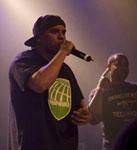
There are a huge number of hip-hop artists and rappers in the United States. Immortal Technique is a popular artist who has ignored requests to sign up with large companies to produce his music. Immortal Technique was born in Lima, Peru. But his family moved to the Harlem area of New York City to escape conflicts in their country. Immortal Technique is considered a political activist. Many of his songs are about politics, poverty, religion, social class and racism. One song that became popular among young people around the world is "The Fourth Branch."
(MUSIC)
VOICE ONE:
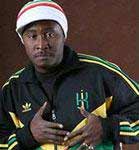
Hip-hop has influenced artists around the world. For example, Didier Awadi is considered the father of African hip-hop. Awadi is a Senegalese musician who created the band called Positive Black Soul in 1989. He started a music center called Studio Sankara. Awadi's songs are about politics, social rights and fair elections in Senegal and other African countries.
In 2007 he produced an album that mixes the speeches of African leaders with African MCs. The album is called "African Presidents." The album aims to bring young MCs from Africa together to explore their history and unite for a better future. Awadi also has an album called "Another World is Possible." In the song "J'accuse," he accuses all the powers and forces that have interfered with the development of Africa.
(MUSIC)
VOICE TWO:
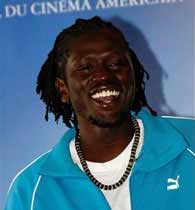
Emmanuel Jal is an African hip-hop artist who has become a well known activist and musician around the world. Jal believes he survived violence to spread a message of peace and forgiveness. At the age of six or seven years old, Emmanuel became a soldier for the Sudan People's Liberation Army. He was made to carry a gun that was taller than he was. For almost five years he fought in wars in Ethiopia and Sudan. A British aid worker, Emma McCune, rescued him and took him to Nairobi, Kenya. She legally made him her son. But Mizz McCune died soon after in an automobile accident.
To help him recover from what he experienced as a child, Emmanuel Jal began singing. When he was in school in Kenya, he fell in love with hip-hop.
He believed the music was an easy and effective way to spread his message. His first CD was "Gua," which means "peace" in the Nuer language of Sudan. The CD made him famous. His second album, "War Child," is about his experiences as a child soldier in Sudan, how he changed and how he wants to make a difference. Emmanuel Jal started an aid organization called Gua Africa. He performs around the world to raise money for the organization. Here is part of the song "War Child."
(MUSIC)
VOICE ONE:
Hip-hop has no borders. In the Philippines, people started listening to it in the early 1980s. One hip-hop artist, Francis Durango Magalona, also known as FrancisM, made this music even more popular in the Philippines. Many of the songs in his first two albums were about political and cultural problems during the 1990s. For example, in his second CD, "Rap Is FrancisM," the song "Halalan" is about political insecurity in the Philippines. Other songs were about the illegal drug problem.
FrancisM became known as the leading socially conscious artist in the Philippines. But in March of 2009 he died from the disease leukemia. Other artists around the world are spreading their own messages through hip-hop music.
(MUSIC)
VOICE TWO:
This program was written by Kim Varzi and produced by Mario Ritter. I'm Steve Ember.
VOICE ONE:
And I'm Barbara Klein. Join us again next week for EXPLORATIONS in VOA Special English.
scratching: a percussive effect obtained by rotating a gramophone record manually: a disc-jockey and dub technique(尤指在說唱樂中的)刮擦技術(shù)
turntable: the circular horizontal platform that rotates a gramophone record while it is being played (唱機(jī)上的)轉(zhuǎn)盤
Related stories:
Exploring Hip Hop art
什么是“嘻哈”?
From traditional to 'freak,' the evolution in American folk music
Motown: Celebrating 50 years of American music
(Source: VOA 英語點津編輯)